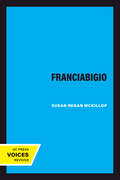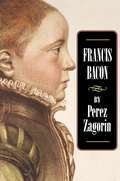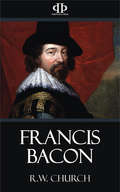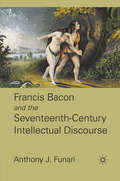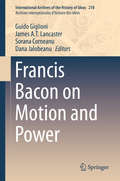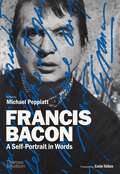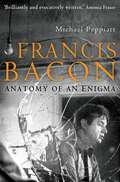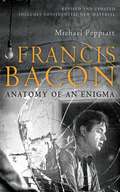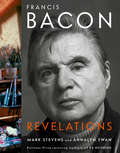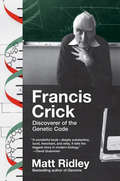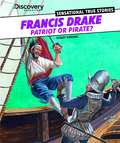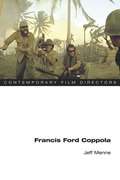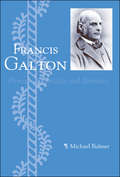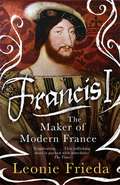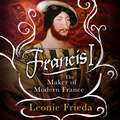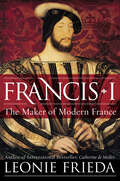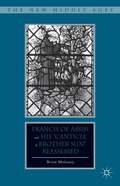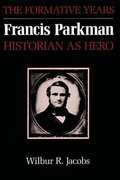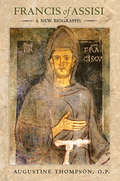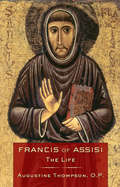- Table View
- List View
Franciabigio (California Studies in the History of Art #16)
by Susan Regan McKillopThis title is part of UC Press's Voices Revived program, which commemorates University of California Press’s mission to seek out and cultivate the brightest minds and give them voice, reach, and impact. Drawing on a backlist dating to 1893, Voices Revived makes high-quality, peer-reviewed scholarship accessible once again using print-on-demand technology. This title was originally published in 1974.
Francis Bacon
by Perez ZagorinFrancis Bacon (1561-1626), commonly regarded as one of the founders of the Scientific Revolution, exerted a powerful influence on the intellectual development of the modern world. He also led a remarkably varied and dramatic life as a philosopher, writer, lawyer, courtier, and statesman. Although there has been much recent scholarship on individual aspects of Bacon's career, Perez Zagorin's is the first work in many years to present a comprehensive account of the entire sweep of his thought and its enduring influence. Combining keen scholarly and psychological insights, Zagorin reveals Bacon as a man of genius, deep paradoxes, and pronounced flaws. The book begins by sketching Bacon's complex personality and troubled public career. Zagorin shows that, despite his idealistic philosophy and rare intellectual gifts, Bacon's political life was marked by continual careerism in his efforts to achieve advancement. He follows Bacon's rise at court and describes his removal from his office as England's highest judge for taking bribes. Zagorin then examines Bacon's philosophy and theory of science in connection with his project for the promotion of scientific progress, which he called "The Great Instauration." He shows how Bacon's critical empiricism and attempt to develop a new method of discovery made a seminal contribution to the growth of science. He demonstrates Bacon's historic importance as a prophetic thinker, who, at the edge of the modern era, predicted that science would be used to prolong life, cure diseases, invent new materials, and create new weapons of destruction. Finally, the book examines Bacon's writings on such subjects as morals, politics, language, rhetoric, law, and history. Zagorin shows that Bacon was one of the great legal theorists of his day, an influential philosopher of language, and a penetrating historian. Clearly and beautifully written, the book brings out the richness, scope, and greatness of Bacon's work and draws together the many, colorful threads of an extraordinarily brilliant and many-sided mind.
Francis Bacon
by R. W. ChurchThe life of Francis Bacon is one which it is a pain to write or to read. It is the life of a man endowed with as rare a combination of noble gifts as ever was bestowed on a human intellect; the life of one with whom the whole purpose of living and of every day's work was to do great things to enlighten and elevate his race, to enrich it with new powers, to lay up in store for all ages to come a source of blessings which should never fail or dry up; it was the life of a man who had high thoughts of the ends and methods of law and government, and with whom the general and public good was regarded as the standard by which the use of public power was to be measured; the life of a man who had struggled hard and successfully for the material prosperity and opulence which makes work easy and gives a man room and force for carrying out his purposes.
Francis Bacon and the Modern Dilemma
by Loren C. EiseleyA critical examination of Francis Bacon, the scientist and educator who founded the scientific method that is used even today to deduce the answer to a given problem.
Francis Bacon and the Seventeenth-Century Intellectual Discourse
by Anthony J. FunariThis book explores the resistance of three English poets to Francis Bacon's project to restore humanity to Adamic mastery over nature, moving beyond a discussion of the tension between Bacon and these poetic voices to suggest theywere also debating the narrative of humanity's intellectual path.
Francis Bacon on Motion and Power
by Sorana Corneanu Guido Giglioni James A.T. Lancaster Dana JalobeanuThis book offers a comprehensive and unitary study of the philosophy of Francis Bacon, with special emphasis on the medical, ethical and political aspects of his thought. It presents an original interpretation focused on the material conditions of nature and human life. In particular, coverage in the book is organized around the unifying theme of Bacon's notion of appetite, which is considered in its natural, ethical, medical and political meanings. The book redefines the notions of experience and experiment in Bacon's philosophy of nature, shows the important presence of Stoic themes in his work as well as provides an original discussion of the relationships between natural magic, prudence and political realism in his philosophy. Bringing together scholarly expertise from the history of philosophy, the history of science and the history of literature, this book presents readers with a rich and diverse contextualization of Bacon's philosophy.
Francis Bacon: A Self-portrait In Words
by Michael PeppiattA new selection of letters, statements, and interviews reveals the preoccupations, thoughts, and ideas of Francis Bacon, one of the twentieth century’s most influential and important artists. The documents selected for Francis Bacon: A Self-Portrait in Words illustrate Bacon’s sharp wit and ability to express complex ideas in highly personal, memorable language. Included here are not only letters to friends, patrons, and fellow artists, but also intriguing notes and lists of paintings. They often come with a sketch as an aide-mémoire or an injunction to himself as he worked in the studio, and many have only come to light since his death. Bacon's letters mirror and reveal his dominant preoccupations at different points throughout his long career. Most of Bacon's letters have never been published and include several that he wrote to author Michael Peppiatt. Particularly intriguing is the record of a dream that he jotted down, outlining impossibly beautiful paintings he had conjured up in his sleep. Together with photographs, archive material, and works by the artist are numerous reproductions of Bacon's characteristic handwriting, from the briefest jottings and notes to more extensive letters and statements. Bacon frequently came up with memorable epithets and definitions. He delighted in doing with words what he set out to do in painting: "I like phrases that cut me." Peppiatt explores the personal legacy of one of the twentieth century's most important painters and presents a compelling verbal self-portrait that reveals both man and artist.
Francis Bacon: Anatomy Of An Enigma (Cla.de.ma Ser.)
by Michael PeppiattPublished in 1996, Francis Bacon: Anatomy of an Enigma was the first in-depth study of the artist's life. It has not been superseded.In this substantially revised, updated edition - to coincide with the artist's centenary, which will be celebrated from autumn 2008 through summer 2009 - Peppiatt will incorporate confidential material Bacon gave him, which he did not include in the first edition. This valuable, first-hand information comes from the hundreds of conversations Bacon had with Peppiatt, often late into the night, over thirty years, particularly during the periods Bacon spent living and working in Paris. It includes insights into Bacon's intimate relationships, his artistic convictions and his general view of life, as well as his acerbic comments on his contemporaries.Peppiatt will draw on some of the fascinating information that has become available in the fifteen years since the artist died. Once jealously guarded by the artist himself, the contents of Bacon's studio can now be freely consulted; Peppiatt has had privileged access to these archives, and he will show how a number of recent discoveries - including wholly unexpected source material - have radically changed the way we look at Bacon's work. Similarly, his recent research into the artist's background - his tortured affair with the sadistic Peter Lacy in Tangier, for instance, and the baffling circumstances of his death in Madrid - will shed light on unexplored areas of Bacon's life and work. Peppiatt will also unveil new information from several people who knew Bacon intimately and who have never gone on record previously.
Francis Bacon: Anatomy of an Enigma
by Michael PeppiattPublished in 1996, Francis Bacon: Anatomy of an Enigma was the first in-depth study of the artist's life. It has not been superseded.In this substantially revised, updated edition - to coincide with the artist's centenary, which will be celebrated from autumn 2008 through summer 2009 - Peppiatt will incorporate confidential material Bacon gave him, which he did not include in the first edition. This valuable, first-hand information comes from the hundreds of conversations Bacon had with Peppiatt, often late into the night, over thirty years, particularly during the periods Bacon spent living and working in Paris. It includes insights into Bacon's intimate relationships, his artistic convictions and his general view of life, as well as his acerbic comments on his contemporaries.Peppiatt will draw on some of the fascinating information that has become available in the fifteen years since the artist died. Once jealously guarded by the artist himself, the contents of Bacon's studio can now be freely consulted; Peppiatt has had privileged access to these archives, and he will show how a number of recent discoveries - including wholly unexpected source material - have radically changed the way we look at Bacon's work. Similarly, his recent research into the artist's background - his tortured affair with the sadistic Peter Lacy in Tangier, for instance, and the baffling circumstances of his death in Madrid - will shed light on unexplored areas of Bacon's life and work. Peppiatt will also unveil new information from several people who knew Bacon intimately and who have never gone on record previously.
Francis Bacon: Anatomy of an Enigma (Cla.de.ma Ser.)
by Michael PeppiattFrancis Bacon was one of the most powerful and enigmatic creative geniuses of the twentieth century. Immediately recognizable, his paintings continue to challenge interpretations and provoke controversy. Bacon was also an extraordinary personality. Generous but cruel, forthright yet manipulative, ebullient but in despair: He was the sum of his contradictions. This life, lived at extremes, was filled with achievement and triumph, misfortune and personal tragedy. In his revised and updated edition of an already brilliant biography, Michael Peppiatt has drawn on fresh material that has become available in the sixteen years since the artist's death. Most important, he includes confidential material given to him by Bacon but omitted from the first edition. Francis Bacon derives from the hundreds of occasions Bacon and Peppiatt sat conversing, often late into the night, over many years, and particularly when Bacon was working in Paris. We are also given insight into Bacon's intimate relationships, his artistic convictions and views on life, as well as his often acerbic comments on his contemporaries.
Francis Bacon: Revelations
by Mark Stevens Annalyn SwanA decade in the making: the first comprehensive look at the life and art of Francis Bacon, one of the iconic painters of the twentieth century--from the Pulitzer Prize-winning authors of de Kooning: An American Master. Francis Bacon created an indelible image of mankind in modern times, and played an outsized role in both twentieth century art and life--from his public emergence with his legendary Triptych 1944 (its images "so unrelievedly awful" that people fled the gallery), to his death in Madrid in 1992.Bacon was a witty free spirit and unabashed homosexual at a time when many others remained closeted, and his exploits were as unforgettable as his images. He moved among the worlds of London's Soho and East End, the literary salons of London and Paris, and the homosexual life of Tangier. Through hundreds of interviews, and extensive new research, the authors probe Bacon's childhood in Ireland (he earned his father's lasting disdain because his asthma prevented him from hunting); his increasingly open homosexuality; his early design career--never before explored in detail; the formation of his vision; his early failure as an artist; his uneasy relationship with American abstract art; and his improbable late emergence onto the international stage as one of the great visionaries of the twentieth century. In all, Francis Bacon: Revelations gives us a more complete and nuanced--and more international--portrait than ever before of this singularly private, darkly funny, eruptive man and his equally eruptive, extraordinary art. Bacon was not just an influential artist, he helped remake the twentieth-century figure.
Francis Crick: Discoverer of the Genetic Code
by Matt RidleyFrancis Crick--the quiet genius who led a revolution in biology by discovering, quite literally, the secret of life--will be bracketed with Galileo, Darwin, and Einstein as one of the greatest scientists of all time. In his fascinating biography of the scientific pioneer who uncovered the genetic code--the digital cipher at the heart of heredity that distinguishes living from non-living things--acclaimed bestselling science writer Matt Ridley traces Crick's life from middle-class mediocrity in the English Midlands through a lackluster education and six years designing magnetic mines for the Royal Navy to his leap into biology at the age of thirty-one and its astonishing consequences. In the process, Ridley sheds a brilliant light on the man who forever changed our world and how we understand it.
Francis Drake: Patriot or Pirate? (Discovery Education: Sensational True Stories)
by Robert SheehanFrancis Drake was a man some considered a hero, while others thought he was nothing more than a criminal. Readers will decide for themselves in this fact-filled volume. Easy-to-follow text and colorful illustrations will keep any young readers interest.
Francis Ford Coppola (Contemporary Film Directors)
by Jeff MenneAcclaimed as one of the most influential and innovative American directors, Francis Ford Coppola is also lionized as a maverick auteur at war with Hollywood's power structure and an ardent critic of the postindustrial corporate America it reflects. However, Jeff Menne argues that Coppola exemplifies the new breed of creative corporate person and sees the director's oeuvre as vital for reimagining the corporation in the transformation of Hollywood. Reading auteur theory as the new American business theory, Menne reveals how Coppola's vision of a new kind of company has transformed the worker into a liberated and well-utilized artist, but has also commodified individual creativity at a level unprecedented in corporate history. Coppola negotiated the contradictory roles of shrewd businessman and creative artist by recognizing the two roles are fused in a postindustrial economy. Analyzing films like The Godfather (1970) and the overlooked Tucker: The Man and His Dream (1988) through Coppola's use of opera, Menne illustrates how Coppola developed a defining musical aesthetic while making films that reflected the idea of a corporation as family--and how his studio American Zoetrope came to represent a new brand of auteurism and the model for post-Fordist Hollywood.
Francis Galton: Pioneer of Heredity and Biometry
by Michael BulmerIf not for the work of his half cousin Francis Galton, Charles Darwin's evolutionary theory might have met a somewhat different fate. In particular, with no direct evidence of natural selection and no convincing theory of heredity to explain it, Darwin needed a mathematical explanation of variability and heredity. Galton's work in biometry—the application of statistical methods to the biological sciences—laid the foundations for precisely that. This book offers readers a compelling portrait of Galton as the "father of biometry," tracing the development of his ideas and his accomplishments, and placing them in their scientific context.Though Michael Bulmer introduces readers to the curious facts of Galton's life—as an explorer, as a polymath and member of the Victorian intellectual aristocracy, and as a proponent of eugenics—his chief concern is with Galton's pioneering studies of heredity, in the course of which he invented the statistical tools of regression and correlation. Bulmer describes Galton's early ambitions and experiments—his investigations of problems of evolutionary importance (such as the evolution of gregariousness and the function of sex), and his movement from the development of a physiological theory to a purely statistical theory of heredity, based on the properties of the normal distribution. This work, culminating in the law of ancestral heredity, also put Galton at the heart of the bitter conflict between the "ancestrians" and the "Mendelians" after the rediscovery of Mendelism in 1900. A graceful writer and an expert biometrician, Bulmer details the eventual triumph of biometrical methods in the history of quantitative genetics based on Mendelian principles, which underpins our understanding of evolution today.
Francis I: The Maker of Modern France
by Leonie FriedaFrancis I (1494-1547) was inconstant, amorous, hot-headed and flawed. Arguably he was also the most significant king that France ever had. A contemporary of Henry VIII of England, Francis saw himself as the first Renaissance king. A courageous and heroic warrior, he was also a keen aesthete, an accomplished diplomat and an energetic ruler who turned his country into a force to be reckoned with. Bestselling historian Leonie Frieda's comprehensive and sympathetic account explores the life of the most human of all Renaissance monarchs - and the most enigmatic.
Francis I: The Maker of Modern France
by Leonie FriedaFrancis I (1494-1547) was inconstant, amorous, hot-headed and flawed. Arguably he was also the most significant king that France ever had. A contemporary of Henry VIII of England, Francis saw himself as the first Renaissance king. A courageous and heroic warrior, he was also a keen aesthete, an accomplished diplomat and an energetic ruler who turned his country into a force to be reckoned with. Bestselling historian Leonie Frieda's comprehensive and sympathetic account explores the life of the most human of all Renaissance monarchs - and the most enigmatic.
Francis I: The Maker of Modern France
by Leonie FriedaFrancis I (1494-1547) was inconstant, amorous, hot-headed and flawed. Yet he was also arguably the most significant king that France ever had. This is his story. A contemporary of Henry VIII of England, Francis saw himself as the first Renaissance king, a man who was the exemplar of courtly and civilised behaviour throughout Europe. A courageous and heroic warrior, he was also a keen aesthete, an accomplished diplomat and an energetic ruler who turned his country into a force to be reckoned with. Yet he was also capricious, vain and arrogant, taking hugely unnecessary risks, at least one of which nearly resulted in the end of his kingdom. His great feud with his nemesis Charles V, the Holy Roman Emperor, defined European diplomacy and sovereignty, but his notorious alliance with the great Ottoman ruler Suleiman the Magnificent threatened to destroy everything. With access to never-before-seen private archives, Leonie Frieda's comprehensive and sympathetic account explores the life of the most human of all Renaissance monarchs - and the most enigmatic.Read by Carole Boyd(p) Orion Publishing Group 2018
Francis I: The Maker of Modern France
by Leonie FriedaLeonie Frieda, the bestselling author of Catherine de Medici, returns to sixteenth-century Europe in the evocative and entertaining biography, Francis I.Catherine de Medici’s father-in-law, King Francis of France, was the perfect Renaissance knight, the movement’s exemplar and its Gallic interpreter. An aesthete, diplomat par excellence, and contemporary of Machiavelli, Francis was the founder of modern France, whose sheer force of will and personality molded his kingdom into the first European superpower. Arguably the man who introduced the Renaissance to France, Francis was also the prototype Frenchman—a national identity was modeled on his character. So great was his stamp, that few countries even now are quite so robustly patriotic as is France. Yet as Leonie Frieda reveals, Francis did not always live up to his ideal; a man of grand passions and vision, he was also a flawed husband, father, lover, and king.With access to private archives previously unused in a study of Francis I, Frieda recreates a remarkable era of French history to explore the life of a man who was the most human of the monarchs of the period—and yet, remains the most elusive.“Superb and vivid . . . brings the world of Francis I to life, skillfully delineating the moves and major players in both European and domestic politics . . . and also gives the reader wonderful glimpses of the often licentious court life of that time . . . Frieda suggests that, under Francis I, France preserved its political power, greatly increased its cultural influence, and positioned itself for the Grand Siecle that his Bourbon successors would soon preside over.” —Wall Street Journal
Francis J Browne (1879-1963): A Biography
by Herbert E ReissFrancis James Browne is remembered as the foremost obstetrician of his day. He is widely recognised as the founder of modern antenatal care. His book, Antenatal and Postnatal Care, became the best of its kind and a bible to many generations of medical students and junior obstetricians. FJ (as he was universally known) was born in Ireland, the fourth of eight children of a County Donegal farmer. He qualified in medicine in Scotland in 1906 and worked for 13 years as a general practitioner in a mining town in Wales. At the age of 39, he took up obstetrics and became assistant to JW Ballantyne in Edinburgh. In 1926, he was appointed Professor of Obstetrics and Gynaecology at University College Hospital, London, where he became renowned for his outstanding teaching and inspirational leadership. He was one of the Founding Fellows of the Royal College of Obstetricians and Gynaecologists and was awarded the Blair-Bell Medal for his significant contribution to the specialty in 1960. In this biography, Herbert Reiss presents a fascinating glimpse into the life of a great man in a deft and vivid portrait.
Francis Of Assisi And His "canticle Of Brother Sun" Reassessed
by Brian MoloneyBringing the skills of a literary historian to the subject, Brian Moloney considers the genesis of Saint Francis of Assisi's Canticle of Brother Sun to show how it works as a carefully composed work of art. The study examines the saint's life and times, the structure of the poem, the features of its style, and the range of its possible meanings.
Francis Parkman, Historian as Hero: The Formative Years
by Wilbur R. JacobsA historian who lived the kind of history he wrote, Francis Parkman is a major--and controversial--figure in American historiography. His narrative style, while popular with readers wanting a "good story," has raised many questions with professional historians. Was Parkman writing history or historical fiction? Did he color historical figures with his own heroic self-image? Was his objectivity compromised by his "unbending, conservative, Brahmin" values? These are some of the many issues that Wilbur Jacobs treats in this thought-provoking study. Jacobs carefully considers the "apprenticeship" of Francis Parkman, first spent in facing the rigors of the Oregon Trail and later in struggling to write his histories despite a mysterious, frequently incapacitating illness. He shows how these events allowed Parkman to create a heroic self-image, which impelled his desire for fame as a historian and influenced his treatment of both the "noble" and the "savage" characters of his histories. In addition to assessing the influence of Parkman's development and personality on his histories, Jacobs comments on Parkman's relationship to basic social and cultural issues of the nineteenth century. These include the slavery question, Native American issues, expansion of the suffrage to new groups, including women, and anti-Catholicism. Francis Parkman, Historian as Hero will be important reading for everyone interested in nineteenth-century American culture and the writing of history. A historian who lived the kind of history he wrote, Francis Parkman is a major--and controversial--figure in American historiography. His narrative style, while popular with readers wanting a "good story," has raised many questions with professional historians. Was Parkman writing history or historical fiction? Did he color historical figures with his own heroic self-image? Was his objectivity compromised by his "unbending, conservative, Brahmin" values? These are some of the many issues that Wilbur Jacobs treats in this thought-provoking study. Jacobs carefully considers the "apprenticeship" of Francis Parkman, first spent in facing the rigors of the Oregon Trail and later in struggling to write his histories despite a mysterious, frequently incapacitating illness. He shows how these events allowed Parkman to create a heroic self-image, which impelled his desire for fame as a historian and influenced his treatment of both the "noble" and the "savage" characters of his histories. In addition to assessing the influence of Parkman's development and personality on his histories, Jacobs comments on Parkman's relationship to basic social and cultural issues of the nineteenth century. These include the slavery question, Native American issues, expansion of the suffrage to new groups, including women, and anti-Catholicism.
Francis of Assisi: A New Biography
by Augustine ThompsonAmong the most beloved saints in the Catholic tradition, Francis of Assisi (c. 1181–1226) is popularly remembered for his dedication to poverty, his love of animals and nature, and his desire to follow perfectly the teachings and example of Christ. During his lifetime and after his death, followers collected, for their own purposes, numerous stories, anecdotes, and reports about Francis. As a result, the man himself and his own concerns became lost in legend.In this authoritative and engaging new biography, Augustine Thompson, O.P., sifts through the surviving evidence for the life of Francis using modern historical methods. The result is a complex yet sympathetic portrait of the man and the saint. Francis emerges from this account as very much a typical thirteenth-century Italian layman, but one who, when faced with unexpected crises in his personal life, made decisions so radical that they challenge his own society—and ours. Unlike the saint of legend, this Francis never had a unique divine inspiration to provide him with rules for following the teachings of Jesus. Rather, he spent his life reacting to unexpected challenges, before which he often found himself unprepared and uncertain. The Francis who emerges here is both more complex and more conflicted than that of older biographies. His famed devotion to poverty is found to be more nuanced than expected, perhaps not even his principal spiritual concern. Thompson revisits events small and large in Francis's life, including his troubled relations with his father, his contacts with Clare of Assisi, his encounter with the Muslim sultan, and his receiving the Stigmata, to uncover the man behind the legends and popular images.A tour de force of historical research and biographical writing, Francis of Assisi: A New Biography is divided into two complementary parts—a stand alone biographical narrative and a close, annotated examination of the historical sources about Francis. Taken together, the narrative and the survey of the sources provide a much-needed fresh perspective on this iconic figure. "As I have worked on this biography," Thompson writes, "my respect for Francis and his vision has increased, and I hope that this book will speak to modern people, believers and unbelievers alike, and that the Francis I have come to know will have something to say to them today."
Francis of Assisi: The Life
by Augustine ThompsonThis elegant and accessible biography of one of Catholicism's most beloved saints was originally published as Part 1 of Francis of Assisi: A New Biography by Augustine Thompson, O.P. It stands alone as a richly informed portrait of a man whose complex faith and commitment continue to inspire today. An introduction by Thompson places his biography in the context of continuing discussions about Francis's legacy, particularly the new Pope's decision to adopt the saint's name.
